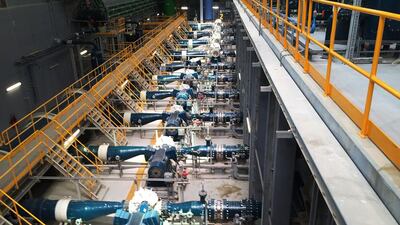RAS AL KHAIMAH // More skilled Emiratis are needed to work in highly technical jobs at a newly opened, multimillion-dirham water desalination plant serving the Northern Emirates.
Employers at the Federal Electricity and Water Authority-operated facility, which cost Dh320 million to build and is situated in Ghalila city in the northernmost part of the emirate, close to the border with Oman, are looking at ways to increase the number of Emiratis on the payroll by working with technical colleges and Government-backed Emiratisation initiatives.
“The plant is new and we have many Emirati women and men working here. However, we are coordinating with the management company to increase the number in the coming year,” said Mohammed Saleh, Fewa’s director.
“It takes time to train qualified staff to operate the plant.”
The desalination plant, which has been running for the past two months on a trial basis, was officially opened on Wednesday. It produces up to 15 million gallons of drinking water a day, drawing seawater from the Arabian Gulf using three pipes that extend 560 metres.
It can store up to 20 million gallons of water, said Mr Saleh, and will provide drinking water to homes across RAK. Importantly, it also uses 24 per cent less energy than other desalination plants.
Suhail Al Mazrouei, the Minister for Energy, said Fewa employed a “good” number of Emiratis working as engineers, but that it lacked local technical staff.
“Fewa in general doesn’t have enough skilled Emirati technicians or operators. We are constantly looking at ways to get more Emiratis to take these positions.
“We try to encourage and support them as much as possible. We constantly try to re-evaluate their salaries and incentives to entice them to join the workforce with us.”
The authority has been coordinating with a number of institutions, including the Abu Dhabi Institute of Applied Technology and Absher, the government programme designed to strengthen the participation of Emiratis in the labour market, to create specialist training schemes for citizens who hold a high-school diploma or university degree.
“We work with the Absher initiative, we take Emiratis every year and interview them in hopes of increasing the amount of Emiratis in Fewa,” said Mr Saleh.
Rabea Ataya, chief executive of the careers website Bayt, said if good salaries, incentives, and training were made available for technical jobs such as working at power stations and desalination plants,Emiratis would take on these roles.
“Across the Gulf region, there are several examples of technical jobs in difficult industries that have been taken on by locals because of the great incentives and education associated with them.
“One such example is in the oil industry, where GCC nationals have worked in significant numbers in non-desk jobs in oil fields and rigs, often in difficult physical conditions.
“The combination of pay and learning have made such a choice rewarding.”
The RAK facility is part of a multibillion-dirham water programme being carried out by Fewa, with another desalination plant costing Dh170m opening in Al Zawra in Ajman. The plants will help to reduce the toll taken on the UAE’s groundwater resources.
tzriqat@thenational.ae

